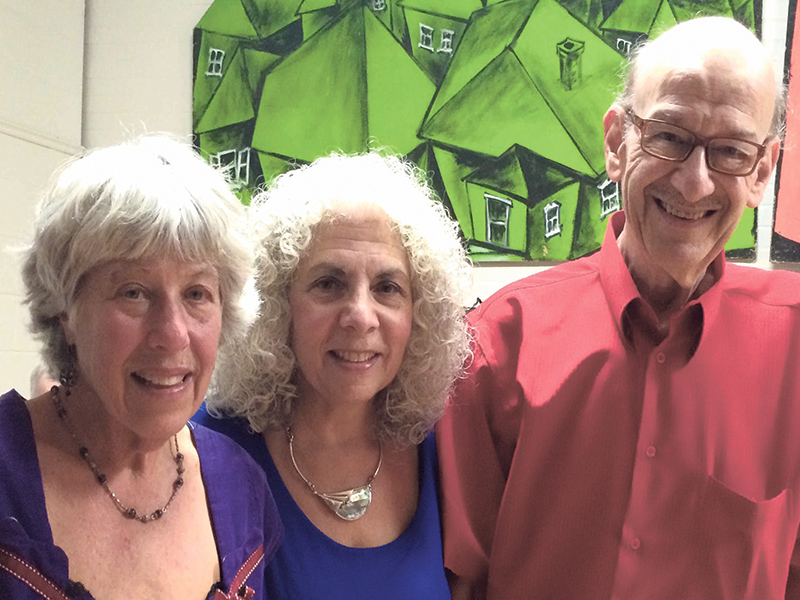Many Polish and Russian Jewish immigrants embraced left-wing ideology in the 1920s and ’30s because of the extreme poverty and harsh working conditions they experienced in their adopted country.
Some of them joined the Labour League, a Canadian left-wing organization that integrated socialism and labour activism with the rich offerings of Yiddish culture.
On Oct. 15, about 200 people celebrated the 90th anniversary of the Labour League – it was founded in 1926 – by attending the musical launch of Ester Reiter’s new book, A Future Without Hate or Need: The Promise of the Left in Canada (Between the Lines, Toronto, 2016).
The festivities were held at the Winchevsky Centre, headquarters of the United Jewish People’s Order (UJPO), which grew out of the Labour League in 1945.
In A Future Without Hate or Need, Reiter, a retired York University sociology professor, chronicles the history of left-wing Jewry in Canada. Her presentation was interspersed with classic folk and Yiddish songs performed by her son, guitarist Daniel Koulack, a longtime member of the Winnipeg-based klezmer group Finjan, and his children George and Ameena Bajer-Koulack.
Most of the first members of UJPO, who had first belonged to the Labour League, have died, but a few of their children recounted their experiences growing up as part of this left-wing movement.
READ: BOOK DESCRIBES THE HISTORY OF THE JEWISH LEFT WING IN CANADA
Maxine Hermolin, executive director of UJPO for some 20 years, said UJPO shaped her values and imbued in her a deep sense of social justice. Much of her exposure to social causes took place at Camp Naivelt, a cottage community in Brampton, Ont., which marked its 90th anniversary last summer.
The cultural offerings at Naivelt – music, drama, art and sing-alongs reinforced UJPO’s commitment to equality and world peace and its focus on dealing with such political issues of the day as the civil rights and women’s lib movements, Hermolin said. “One of the core values was that people can make a difference through protest.”
Her family’s history with the Labour League dates back to her grandmother, Eva Swartz, a young widow, who was introduced to the Labour League community when she joined its Yiddish reading circle.
Hermolin, now a grandmother of two, said her role model was her own mother, Lee Schechter, who led UJPO in an executive director-type role from 1959 to the early ’90s. “My mother was instrumental in holding the organization together. She was a pillar of strength and wisdom.”
David Abramowitz, president of UJPO-Canada, said that his father, Albert, joined the Labour League shortly after his arrival in Canada in 1928. Later, he became one of UJPO’s leaders.
His father, a tailor, had been a union member in Poland from the age of 13. “Workers there were fighting to have their work week reduced from 80 to 60 hours a week. Here, it was 60 hours and the workers wanted 40 hours.”
Abramowitz traces his own involvement in UJPO to his interest in drama, which began at age three, when he performed at a Winchevsky school concert.
He said that while social causes have fuelled the organization, “culture is its life blood.” He pointed to the Jewish Folk Choir, which was very well respected during its 90-year run, and the annual arts and music weeks at Camp Naivelt still remain popular programs.
READ: REKINDLING THE LIGHT OF JEWISH SOCIAL JUSTICE
Camp Naivelt spawned several notable music careers. In a telephone interview, Sharon Hampson, of Sharon, Lois & Bram fame, said she got her musical start at the Naivelt sing-alongs, where her parents, Molly and Irving Trostin, had a cottage.
She frequently performed with another Naivelt cottager, the late Zal (Zalman) Yanovsky, a co-founder the popular ’60s rock group The Lovin’ Spoonful.
The Travellers, one of Canada’s best-known folk groups from the 1950s to the ’70s, also had roots at Naivelt. In fact, Hampson’s American-born husband, the late Joe Hampson, joined the Travellers in 1965. She said the rich musical life at Naivelt, especially concerts with folk legend Pete Seeger, a frequent visitor, had a huge impact on her career, and she still feels a strong connection to the community. “There was so much warmth and kindness. People were very supportive and they looked out for one another. It was a very caring place.”
Ester Reiter speaks at Winnipeg’s Asper Jewish Community Centre Nov. 20 and Vancouver’s Peretz Centre for Secular Jewish Culture Dec. 1.
